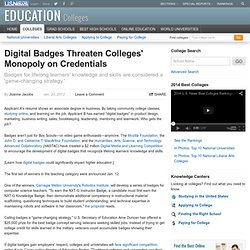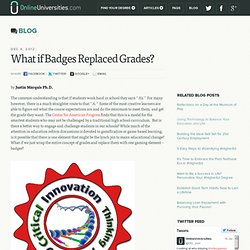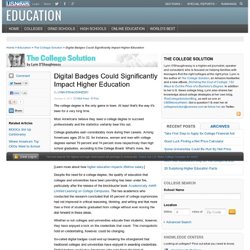

L'apprentissage. Henry Jenkins. Pour créer des bons Bagdes. Les Badges c'est pour les Scouts ! Let’s make badges not stink : Sharing Nicely. There is a lot of noise about badges at the moment with opinions ranging from “we don’t need no stinkin’ badges” to “badges will lead to global peace.”

I have been one of the original instigators (PDF) of the badges for learning movement (is it really a movement?) , but my favorite session at the recent DML conference was Mitch Resnick’s panel “Are badges the answer” which looked at the wide range of factors that motivate learning and discussed possible negative effects that badges could have on motivation. Here is my nutshell summary of the panel: Research suggests that introducing an extrinsic reward (in the form of a badge) will decrease existing intrinsic motivation. Les Badges tuent l’apprentissage informel. Doug Belshaw. Que sont les Open - Badges. Réputation. Les Big Data et l'emploi.
Pas très catholique avec les Big-Data ! How Big Data Is Playing Recruiter for Specialized Workers. Assumer son idendité numérique : une question de confiance ? Doug Belshaw. Qui délivre les Badges ? Serge ravet. Open Trust Box. Le Badge est le témoignage d'un vécu. Le diplôme. Validation partielle des cursus entièrement en ligne. Digital Badges Threaten Colleges' Monopoly on Credentials.
Applicant A's résumé shows an associate degree in business.

By taking community college classes, studying online, and learning on the job, Applicant B has earned "digital badges" in product design, marketing, business writing, sales, bookkeeping, leadership, mentoring and teamwork. Who gets the job? Badges aren't just for Boy Scouts—or video game enthusiasts—anymore. The Mozilla Foundation; the John D. and Catherine T. MacArthur Foundation; and the Humanities, Arts, Science, and Technology Advanced Collaboratory (HASTAC) have created a $2 million Digital Media and Learning Competition to encourage the development of digital badges that recognize lifelong learners' knowledge and skills.
[Learn how digital badges could significantly impact higher education.] The first set of winners in the teaching category were announced Jan. 12. One of the winners, Carnegie Mellon University's Robotics Institute, will develop a series of badges for computer science teachers. Open Badges: Portable Credentials for Learning by Bill Brandon.
“Are badges frivolous, superficial, or worthless?

Will employers, job applicants, and providers use them or not? Time will tell, but what is certain is that the way is open to anyone who wants to learn almost anything and to do it at the time and location of their choosing. The means of certifying and documenting that learning are evolving now, and badges are becoming a viable alternative.” Disintermediation rolls on. The next target is diplomas, certifications, and other “official” records of learning, education, and skills and knowledge achievement. Credentialing initiatives In one development now underway, Mozilla and the MacArthur Foundation are working toward widespread recognition of a credentialing system that uses badges from providers, awarded directly to learners, and maintained and displayed by those learners, independent of employers, and publicly available.
C'est quoi un robot – grader ? La menace des machines. Tech_Frontiers_Report_M_WEB.indd - EIU_Humans_And_Machines_Whitepaper.pdf. Que signifie le diplôme quand on se forme tout au long de la vie ? Evaluation. Peux t-on évaluer en ligne ? Remplacer les notes par les Badges. What if Badges Replaced Grades? The common understanding is that if students work hard in school they earn "A’s.

" For many however, there is a much straighter route to that "A. " Some of the most creative learners are able to figure out what the course expectations are and do the minimum to meet them, and get the grade they want. The Center for American Progress finds that this is a model for the smartest students who may not be challenged by a traditional high school curriculum. But is there a better way to engage and challenge students in our schools? While much of the attention in education reform discussions is devoted to gamification or game-based learning, is it possible that there is one element that might be the lynch pin to major educational change?
The Evidence is Conclusive A July 2012 report from the Center for American Progress, Do Schools Challenge Our Students? Le diplôme est - il suffisant pour prouver les capacités ? Digital Badges Could Significantly Impact Higher Education - The College Solution. The college degree is the only game in town.

At least that's the way it's been for a very long time. Most Americans believe they need a college degree to succeed professionally and the statistics certainly bear this out. College graduates earn considerably more during their careers. Among Americans ages 25 to 32, for instance, women and men with college degrees earned 79 percent and 74 percent more respectively than high school graduates, according to the College Board.
What's more, the unemployment rates of college graduates has been consistently about half that of high school graduates. [Learn more about how higher education impacts lifetime salary .] Despite the need for a college degree, the quality of education that colleges and universities have been providing has been under fire, particularly after the release of the blockbuster book Academically Adrift: Limited Learning on College Campuses . Thomas Friedman (New York Times) Les Licornes pourpres.